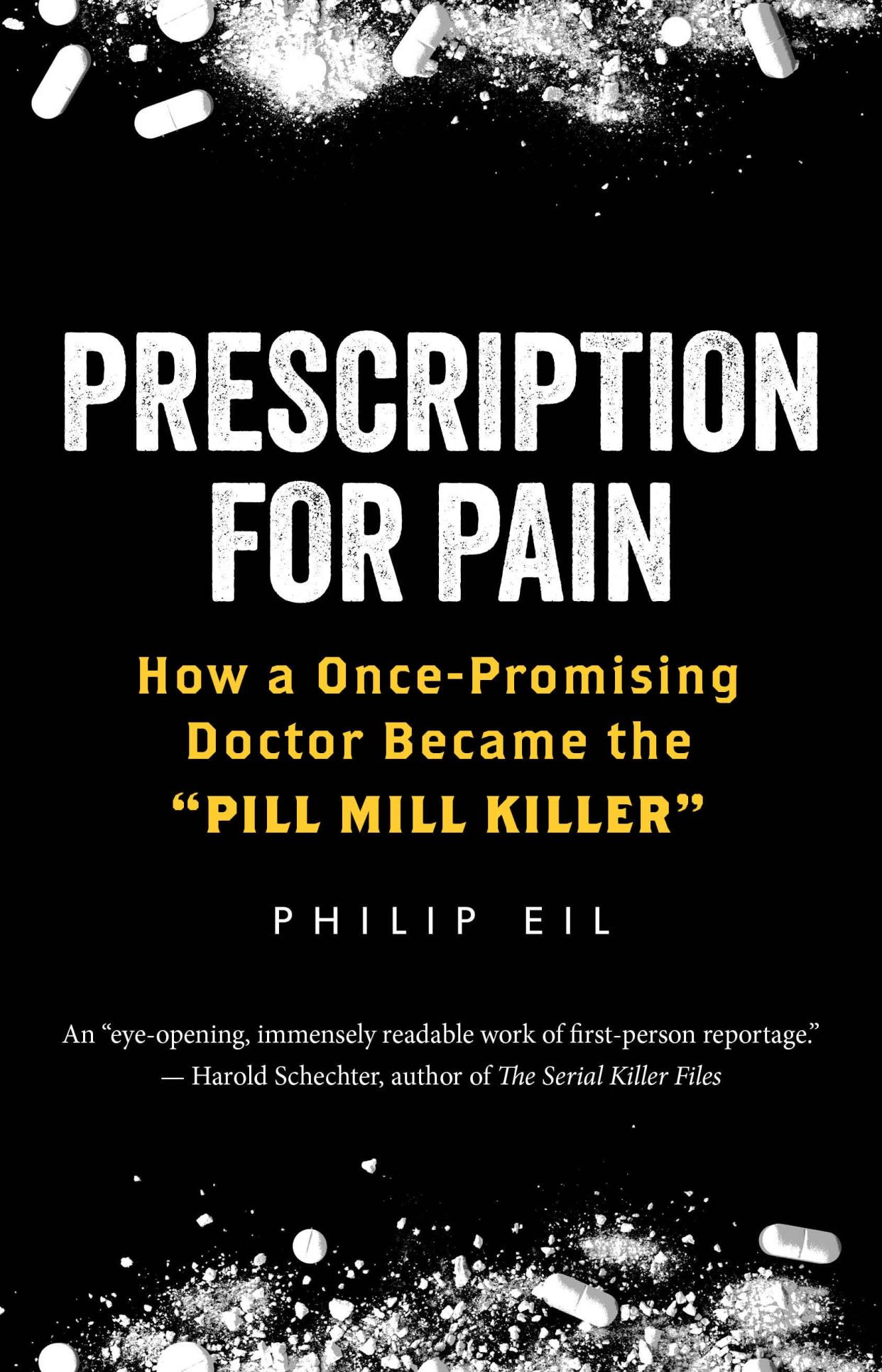'Pill Mill Killer' killed at least 13 people. Providence journalist's book tells his story
PROVIDENCE – Rhode Island journalist Philip Eil had little idea what would happen when a story, he said, “fell into my lap.”
The story grew into a 12-year odyssey and a book, “Prescription for Pain: How a Once-Promising Doctor Became the ‘Pill Mill Killer,’” a compelling true-crime saga about the rise and fall of Dr. Paul Volkman.
Initially, the story was thesis material for a master’s degree in nonfiction writing at Columbia University, but after a seminar in book writing, also at Columbia, Eil saw the potential for a book.
Several life detours later, including full-time work as news editor and staff writer at the Providence Phoenix, Eil has the book in his hands and another story to tell about how it happened.
Eil's personal connection with Volkman
The story “fell” after Volkman got in touch with Eil’s father, Dr. Charles Eil. The two had been undergrads at the University of Rochester and classmates in a M.D. and Ph.D. program at the University of Chicago, graduating in 1974.

They had lost touch, but the death of Volkman’s wife brought them together at a crucial time. Volkman, a once-promising physician, was facing federal charges in a prescription drug-dealing enterprise, which ultimately resulted in the longest imprisonment stemming from the opioid epidemic – four consecutive life sentences.
While Volkman’s story is at the core of the book, Eil also investigates big-picture issues, including the “enthusiasm” in the early 2000s for aggressive pain treatment, and about personal tragedies of families who lost loved ones to overdose deaths.
For a true-crime fan, “Prescription for Pain” is a page-turner.
From promising medical career to 'doctor for hire' at pain clinic
As promising as Volkman’s professional career had seemed, by 2003 he was working as a temporary “doctor for hire” at a pain clinic in a medically underserved area of southern Ohio, commuting weekly from his home in an upscale neighborhood of Chicago.
It was a time when aggressively treating pain was promoted, which opened a door to abuse.
“It was the biggest public health problem at the time, and it was kicked off by prescription opioids,” according to Lisa Roberts, a public health nurse for the city health department in Portsmouth, Ohio, who became one of Eil’s reliable sources.
Although Volkman maintained he was treating people appropriately, he became the linchpin in a lucrative “pill mill” operation and by 2005 was running his own dispensary, writing prescriptions for as many as 240 pills at a time. His orders for oxycodone and hydrocodone made him the number-one practitioner-purchaser in the entire United States.
Ultimately, the Drug Enforcement Administration investigated. Volkman was arrested in dramatic fashion at his Chicago home and went to trial in March 2011. On Valentine’s Day in 2012, he was given four consecutive life sentences.
In his book, Eil examines how treating pain was twisted into a societal problem, but he humanizes it with the personal stories of 13 families of overdose victims. His reporting gives readers multiple perspectives on both the policies and the people involved.
He spoke and corresponded extensively with Volkman.

“He was all too eager to talk about himself,” Eil said. “But I also wanted to offer fact-checking and other perspectives. Given his personality and combativeness, I knew whatever I wrote, he was going to be infuriated. I wanted the book to withstand scrutiny from him and others.”
Eil's roundabout route to telling this story
Eil’s research began in 2009 but did not follow a linear path.
The process overlapped with his studies at Columbia; teaching, including an adjunct position at the Rhode Island School of Design; and work as a freelance writer for publications including Rhode Island Monthly, The Boston Globe and Jewish Rhode Island.
'Tenfold More Wicked': Podcast digs into 1673 murder of one of Portsmouth's founders
When the Phoenix closed in 2014, “I dusted off the project,” he said. “I found no matter how long I put it on the shelf, it struck me as just as important and interesting as it first had.”
He encountered time-consuming roadblocks, such as learning how to file a Freedom of Information Act request in order to access documents from Volkman’s trial.
Frustrated when prosecutors largely provided only heavily redacted records, Eil contacted the Rhode Island affiliate of the American Civil Liberties Union, which agreed the documents had been wrongfully withheld and ultimately won access.
“It was a real-life civics lesson and a bit of a legal education, too,” he said.
He recalls that on multiple trips to Ohio for in-person research, his reception was “a bit mixed. Some people were eager to get the story out. Others had heard about my entry to the case – my dad had gone to school with Volkman – and thought I must be there to try to clear his name.
“There was some suspicion I had to overcome. I was simply a journalist interested in truth, and I met a lot of people who trusted me.”
Roberts, the public health nurse, was among them.
“It’s always good to have someone from the outside come to elevate the story and get the attention of people who could do something about it,” she said recently during a telephone interview. “I was able to point him in the right direction for people to talk to.”
'Like none other': Grand Bellevue Dining Experience offers train ride with a side of murder
He took deep dives into understanding malpractice lawsuits, which had plagued Volkman even before his pill mill days, and the history of the opioid epidemic. His exhaustive research entailed reading thousands of pages of documents and interviewing more than 150 people.
Mission accomplished
“It is an important story, and in order to tell it well, I needed to learn about so many subjects,” Eil said, but organizing all that information into a readable book was no small challenge.
Mike Stanton, former Providence Journal reporter and author of the bestseller “The Prince of Providence,” about the late Providence Mayor Vincent A. "Buddy" Cianci, among other books, became a sounding board.
“I talked with him about the process,” Stanton said during a telephone interview, from how to file a Freedom of Information Act request to weaving in the personal dimensions of the story.
“I wouldn’t overstate my role,” Stanton said. “I’d listen to him, which section he was working on, and give him feedback.”
Now that the book is published, Eil says he has two measures of success.
“Simply completing the book, collecting all the information I could, accepting the questions I could never answer, being thorough, accurate and fair, and finding a place to publish it.” Steerforth Press of Lebanon, New Hampshire, which focuses on works of narrative nonfiction, turned out to be a perfect fit.
The second is a personal benchmark. “There is no greater responsibility for a journalist than to tell stories of victims of a crime who are no longer around to speak for themselves,” he said. “I hope that family members of people who lost their lives feel that the book honors the humanity of their loved ones.”
This article originally appeared on The Providence Journal: 'Pill Mill Killer' focus of RI journalist's Philip Eil true-crime book
